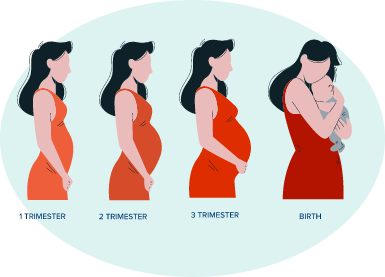





No lab centers are available in this city
Definition of Tubal Pregnancy
Normally, during pregnancy, a fertilised egg attaches itself to the uterine lining. However, many times, due to certain conditions or issues, an egg gets implanted outside the uterus, which is known as an ectopic pregnancy. When an ectopic pregnancy occurs in the fallopian tube, it is known as a tubal pregnancy, meaning that the fertilised egg somehow implants itself in the fallopian tube before reaching the uterus.
A fertilised egg cannot survive outside the uterus and if left untreated, it can lead to tubal rupture, which in ectopic pregnancy is a common risk that can be fatal in severe cases.
By definition, tubal pregnancy is a rare but potentially life-threatening condition that requires immediate attention and treatment. Tubal pregnancy is cause for concern but does not necessarily indicate fertility issues as after treatment or surgery for tubal pregnancy, women may still be able to conceive and go on to have healthy pregnancies.
Symptoms of Tubal Pregnancy
the early symptoms of tubal pregnancy are similar to those of a normal pregnancy. However, some may also experience some additional symptoms that may be indicative of a tubal pregnancy. These include:
In case of a tubal rupture in ectopic pregnancy, other symptoms may also appear, depending on where the blood is collecting and the nerves that are being irritated by the same. Common symptoms of tubal rupture in ectopic pregnancy include:
Causes of Tubal Pregnancy
Conditions that can affect the movement of the egg down the fallopian tube can lead to the development of a tubal ectopic pregnancy. This may include:
There are also several risk factors that increase the chance of one having a tubular ectopic pregnancy:
How to Manage Tubal Pregnancy
As most early symptoms of tubal pregnancy are similar to those of a normal pregnancy, many people don’t find out about it being tubal until their prenatal check-up or ultrasound. For diagnosis, certain tests for tubal pregnancy may be prescribed, including:
Tubal pregnancy is a medical emergency requiring urgent treatment and early detection and diagnosis are essential for proper management of the condition. Healthcare providers generally prescribe medication and surgery for tubal pregnancy treatment:
While it is not possible to prevent a tubal ectopic pregnancy, there are several lifestyle and habit modifications that can help lower one’s risk of developing a tubal pregnancy. These include:
When to See an OB/GYN?
If one is pregnant, it is crucial for them to ensure they get all necessary prenatal check-ups done on time. A tubal pregnancy can be detected during the first trimester during the prenatal tests. In case the doctor suspects something, they can prescribe the required test for tubal pregnancy for confirmation. Other than this, emergency medical care should be provided if one starts showing signs or symptoms of a tubal pregnancy, as listed above, like severe pelvic pain or abdominal pain with vaginal bleeding, fainting, extreme light-headedness, shoulder pain, etc.
Whether it is a test for tubal pregnancy detection or tests to monitor HCG levels post treatment of a tubal pregnancy, it is extremely convenient to book diagnostic tests at Max Lab. One may also opt for an at-home sample collection. Test reports are generated in quick time and made available online at our website for download. Once the report has been generated, it is suggested that patients consult their doctor for a proper diagnosis and treatment plan.



Get ready for your baby's arrival
Sign up takes less than 60 secs and gives you access to your offers, orders and lab tests.
Looks like you are not registered with us. Please Sign up to proceed
OTP will be sent to this number by SMS
We have successfully received your details. One of the agents will call you back soon.
 To reach our help desk call 9213188888
To reach our help desk call 9213188888
No Lab Centers are available in this city
Looks like you are not registered with us. Please Sign up to proceed
OTP will be sent to this number by SMS
Not Registered Yet? Signup now.Looks like you are not registered with us. Please Sign up to proceed





 7982100200
7982100200.png)